In a relatively quiet week Germany continued its preparations for the invasion of the Soviet Union, although Hitler did not mention this to Mussolini when the two dictators met on 2 June. Meanwhile, German air attacks on Malta continued. On Sunday 8 June, British, Commonwealth and Free French forces invaded Syria, which was held by Vichy France.
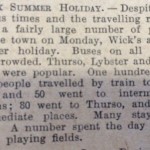 The people of Wick enjoyed mixed fortunes this week. The week started tranquilly enough as the John O’Groat Journal reported that on Monday the town enjoyed its annual summer holiday: “One hundred and fifty people travelled by train to Lybster, and 50 went to intermediate stations; 80 went to Thurso, and 30 to intermediate places. Many stayed at home. A number spent the day in the public playing fields.”
The people of Wick enjoyed mixed fortunes this week. The week started tranquilly enough as the John O’Groat Journal reported that on Monday the town enjoyed its annual summer holiday: “One hundred and fifty people travelled by train to Lybster, and 50 went to intermediate stations; 80 went to Thurso, and 30 to intermediate places. Many stayed at home. A number spent the day in the public playing fields.”
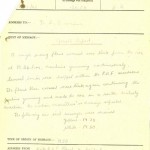
Then, on Thursday, “A single enemy plane crossed over Wick from the sea at 19.24 hours, machine gunning continuously. Several bombs were dropped within the R.A.F. aerodrome. The plane then crossed over Wick again continuing the machine gunning and made to sea in a south easterly direction. No civilian casualties or damage reported.”
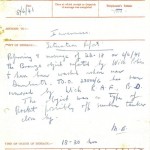 Mysterious objects were still being washed up along the Caithness coast. On 8 June there was “a bronze object reported by Wick Police to have been washed ashore near Dunbeath.” Bomb disposal experts from Wick airfield came and took it away, concluding that “The object was a type of Rocket possibly off a sunken tanker close by.”
Mysterious objects were still being washed up along the Caithness coast. On 8 June there was “a bronze object reported by Wick Police to have been washed ashore near Dunbeath.” Bomb disposal experts from Wick airfield came and took it away, concluding that “The object was a type of Rocket possibly off a sunken tanker close by.”
Over in Orkney, Hetty Munro of Thurso kept up her diary of daily life on the island. This week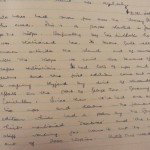 she wrote about The Orkney Blast, the forces’ newspaper started by the writer Eric Linklater which ran from January 1941 to November 1944. Its editor was Gerry (“Geremy”) Meyer. “We have had some fun over the “Orkney Blast” this week. This is a paper started in January for the troops. Originally by Eric Linklater when he was stationed here… It’s had lots of ups and downs and the first edition came out in a raging blizzard by dint of stupendous efforts on the part of George Tuck, Geremy and [Lieutenant] Crichton.”
she wrote about The Orkney Blast, the forces’ newspaper started by the writer Eric Linklater which ran from January 1941 to November 1944. Its editor was Gerry (“Geremy”) Meyer. “We have had some fun over the “Orkney Blast” this week. This is a paper started in January for the troops. Originally by Eric Linklater when he was stationed here… It’s had lots of ups and downs and the first edition came out in a raging blizzard by dint of stupendous efforts on the part of George Tuck, Geremy and [Lieutenant] Crichton.”
There is a lot more about The Orkney Blast, including an interview with Gerry Meyer who went on to edit The Orcadian, at the Remembering Scotland At War website: http://www.rememberingscotlandatwar.org.uk/Accessible/Exhibition/194/The-Orkney-Blast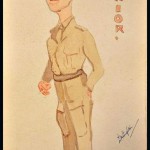
Hetty Munro preserved a number of extraordinary caricatures of the officers she worked with during the war. Here is one of Lt. Crichton, intelligence officer, and signed by him.
The John O’Groat Journal reported that, at a meeting of the County Council, Mr William 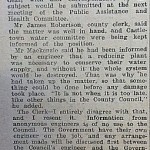 Mackenzie “drew attention to the serious scarcity of water in Castletown, particularly among the tenants of the new houses at the top of the village.” When told that the matter was being dealt with, Mr Mackenzie protested that the system was at risk of collapse: “When you go into the matter you will find that my statement is correct.” This resulted in a crushing reply from the Clerk: “Frankly, you don’t seem to know anything about it”; and the matter was closed.
Mackenzie “drew attention to the serious scarcity of water in Castletown, particularly among the tenants of the new houses at the top of the village.” When told that the matter was being dealt with, Mr Mackenzie protested that the system was at risk of collapse: “When you go into the matter you will find that my statement is correct.” This resulted in a crushing reply from the Clerk: “Frankly, you don’t seem to know anything about it”; and the matter was closed.
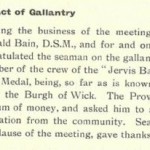 Finally this week, on 6 June Wick Burgh Council honoured Seaman Donald Bain, survivor of HMS Jervis Bay which had been sunk defending a convoy of merchant ships in November 1940. Seaman Bain had been awarded the Distinguished Service Medal, “being, so far as is known, the first award in this war to a citizen of the Burgh of Wick. The Provost handed Seaman Bain a wallet with a sum of money, and asked him to accept the gift as a small token of appreciation from the community.”
Finally this week, on 6 June Wick Burgh Council honoured Seaman Donald Bain, survivor of HMS Jervis Bay which had been sunk defending a convoy of merchant ships in November 1940. Seaman Bain had been awarded the Distinguished Service Medal, “being, so far as is known, the first award in this war to a citizen of the Burgh of Wick. The Provost handed Seaman Bain a wallet with a sum of money, and asked him to accept the gift as a small token of appreciation from the community.”
